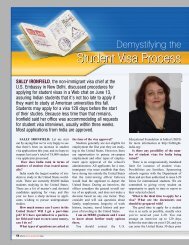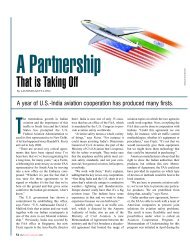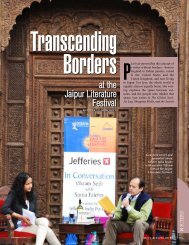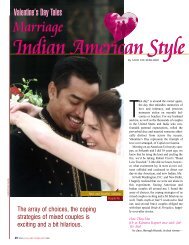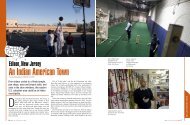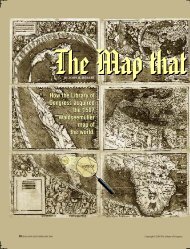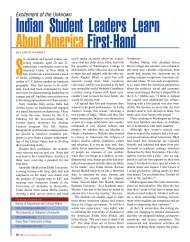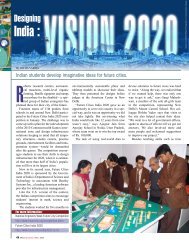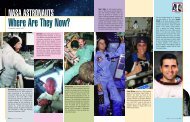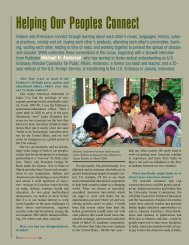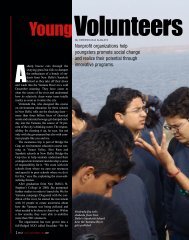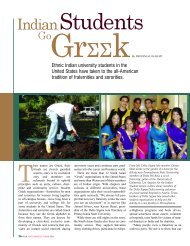Create successful ePaper yourself
Turn your PDF publications into a flip-book with our unique Google optimized e-Paper software.
JAI NAIR, the child of immigrants from Kerala and<br />
Scotland, is part of a “tandem couple” program in the U.S.<br />
Foreign Service. He and his wife, Siriana, have each taken<br />
a turn at jobs as consular and political officers in New Delhi<br />
since they arrived in February 2004.<br />
The visa work can be stressful, says Nair. “You have to<br />
make quick decisions all the time. You try to make the right<br />
decisions. With the growth in U.S.-India business relations<br />
there has been an enormous growth of visa work. With so<br />
many people traveling back and<br />
forth, we’re having a hard time<br />
keeping up. We are adding new<br />
windows as fast as we can in<br />
consulates and the embassy.”<br />
His political work involved<br />
talking with Indian officials,<br />
academics, other diplomats and<br />
reporting to Washington on<br />
“India’s priorities, where the U.S.<br />
can match up and interact.” Nair<br />
has a physics degree from Harvard<br />
and a master’s in nuclear<br />
engineering from the University<br />
of Maryland. He worked as an<br />
analyst in the natural gas industry<br />
and in aircraft avionics before<br />
joining the Foreign Service.<br />
In India, his first posting, Nair<br />
says, “People are tickled that I’m<br />
half Indian and have responsibility<br />
in the U.S. government. It’s a<br />
good thing for <strong>American</strong> policy<br />
for people to see I’m doing the<br />
same thing as someone of an all-<br />
European background.”<br />
Nair says he is most proud of “my parents’ and grandparents’<br />
actions, more than just where they came from. My dad started<br />
working his way through school, became an electrical engineer,<br />
got into computer systems starting out, then quit his job, and<br />
said, ‘I can do it on my own.’”<br />
It wasn’t until Nair got a chance to visit his father’s boarding<br />
school, Lawrence in Tamil Nadu, that he fully understood why<br />
he was so incredibly disciplined. “We went to the school and<br />
46 SPAN SEPTEMBER/OCTOBER 2005<br />
LAURINDA KEYS LONG<br />
JAI NAIR “The way my grandmother and aunt<br />
remembered it would have been<br />
inaccurate....I was expecting to see<br />
their rural India. But here in New<br />
Delhi, a big city is like any big city.”<br />
the motto is on all their blazers: ‘Never give in,’ ” says Nair.<br />
Nair’s father, Prasad, a native of Chengannur in Kerala,<br />
emigrated to the United States with his parents and younger<br />
sister at the age of 16, when his father, V.S.P. Nair, an Indian<br />
Air Force squadron leader, was posted to the Indian Embassy<br />
in Washington, D.C., as an assistant air attaché.<br />
When V.S.P. Nair died of a heart attack, his wife stayed on to<br />
let her children finish their studies. Prasad Nair decided to remain<br />
in the United States after finishing college. He married an<br />
immigrant from Scotland and<br />
their three children were born in<br />
America.<br />
“My grandmother and aunt<br />
would tell us stories” about<br />
India, Nair says. He had a<br />
chance to visit Kerala last<br />
November, “see the old family<br />
home, see where the coconut<br />
fields were, and the politics. It<br />
was interesting seeing red<br />
hammer-and-sickle flags.”<br />
Nair had not visited India<br />
before. “Something that was<br />
shocking for an <strong>American</strong>, even<br />
growing up knowing about it,<br />
is the really strong class<br />
differences. I’m not referring<br />
just to caste,” he says. “It’s<br />
Jai Nair at<br />
theU.S.<br />
Embassy.<br />
surprising how people here<br />
treat their superiors and<br />
subordinates. It would make<br />
most <strong>American</strong>s uncomfortable.<br />
It’s a surprise when you go into<br />
a wealthy home, ornate, wellfurnished,<br />
then you step into the<br />
kitchen and it changes; it’s not the space of the residents of the<br />
house. But the growth of the middle class is breaking that down.”<br />
He says, “The India I learned about growing up has really<br />
changed, now especially with the economic changes. But the<br />
way my grandmother and aunt remembered it would have been<br />
inaccurate whether India had changed or not. I was expecting<br />
to see more of their rural India. But here in New Delhi, a big<br />
city is like any big city.” <br />
LAURINDA KEYS LONG




